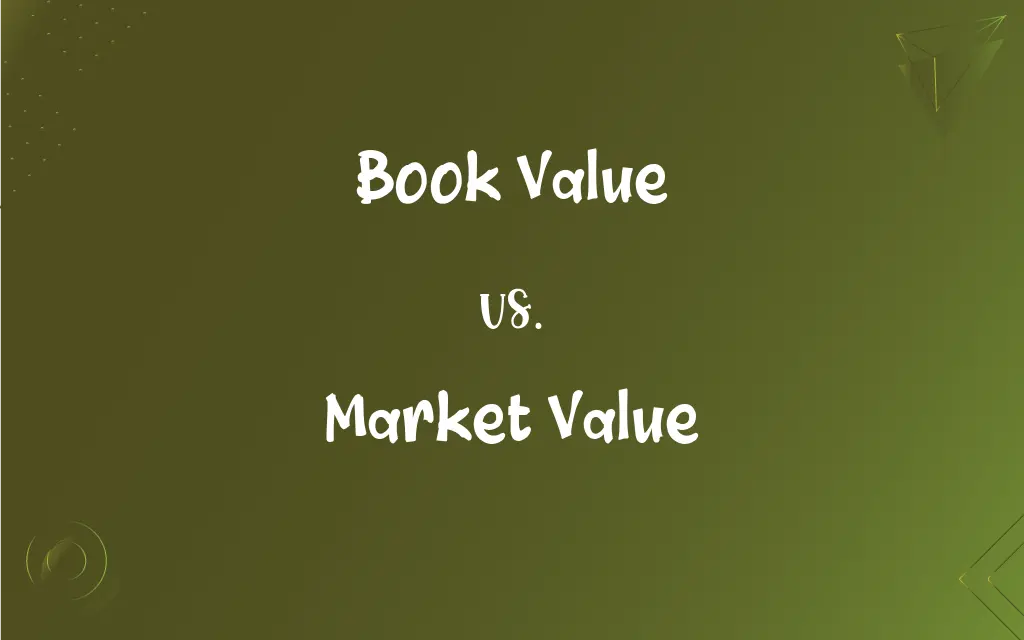Book Value vs. Market Value: What's the Difference?
Edited by Janet White || By Harlon Moss || Updated on October 25, 2023
Book value is an asset's value according to its balance sheet, while market value is what it's worth in the current market.

Key Differences
Book value represents the value of an asset as it appears on a company's balance sheet, calculated by taking the cost of the asset minus accumulated depreciation. It's essentially the historical cost of an asset or liability, adjusted for any amortizations, impairments, or other accounting methods. Market value, on the other hand, represents the current value at which the asset can be bought or sold in the market. This is a dynamic value, constantly changing based on supply, demand, and other market factors.
While book value is derived from the company's financial statements and remains relatively consistent over time (unless there are adjustments), market value can fluctuate rapidly. The book value of an asset or company may stay the same over a fiscal quarter, but its market value might vary daily, hourly, or even by the minute, particularly for publicly traded companies.
Book value gives a sense of the underlying value of an asset or a company. If a company's share price is below its book value, it might be considered undervalued by some investors. Conversely, market value offers a real-world sense of what people are willing to pay for it right now. This is often influenced by investor sentiment, market trends, and external news.
In some cases, there might be a significant discrepancy between book value and market value. For tangible assets like property or machinery, book value can be closer to actual value, though still not always reflective of market conditions. But for intangible assets or entire companies, market value might significantly exceed book value due to factors like brand recognition, future growth potential, or perceived market leadership.
Comparison Chart
Basis
Accounting records
Current market conditions
ADVERTISEMENT
Stability
Relatively consistent
Fluctuates regularly
Calculation
Cost of the asset minus accumulated depreciation
What buyers are willing to pay for it
Influences
Accounting methods, historical costs, depreciation
Supply, demand, investor sentiment, news, trends
Application
Balance sheets, financial statements
Stock markets, real estate listings, auctions
Book Value and Market Value Definitions
Book Value
Represents the net asset value of a company.
The total assets minus total liabilities provide the book value.
ADVERTISEMENT
Market Value
Reflects investor sentiment and trends.
Market value increased due to positive company news.
Book Value
Historical cost adjusted for depreciation.
After accounting for depreciation, the book value decreased.
Market Value
Represents what buyers are willing to pay.
The artwork's market value soared at the auction.
Book Value
Asset's value on a company's balance sheet.
The book value of the equipment is $10,000.
Market Value
Fluctuates based on market conditions.
The market value rose due to high demand.
Book Value
Underlying value of an asset or company.
The company's shares trade below its book value.
Market Value
Current value at which an asset can be traded.
The market value of the house is $500,000.
Book Value
Value before market influence.
The book value gives an intrinsic sense of an asset's worth.
Market Value
Dynamic and can vary rapidly.
Stock market values change every trading second.
FAQs
What does book value represent?
Book value is the value of an asset as it appears on a company's balance sheet.
Which is more volatile, book value or market value?
Market value is more volatile due to its susceptibility to external factors.
Is market value always higher than book value?
Not necessarily; it depends on market conditions and perceptions.
How is market value determined?
Market value is determined by what buyers are willing to pay in the current market.
How is depreciation related to book value?
Depreciation reduces the book value of tangible assets over time.
How is book value calculated for a company?
By subtracting total liabilities from total assets.
Why might market value fluctuate rapidly?
Due to supply and demand, investor sentiment, news, and market trends.
Can market value be subjective?
Yes, as it's based on what buyers are willing to pay, which can be influenced by perceptions.
Is book value a good indicator of a company's worth?
It's one indicator, but market value, future potential, and other factors should also be considered.
How often does market value change for publicly traded companies?
Continuously, as stocks are traded during market hours.
How often is book value updated?
Typically, when financial statements are prepared, such as quarterly or annually.
Can market value be zero?
Yes, if no one is willing to buy the asset or if it's considered worthless.
Why might a company's stock trade below its book value?
Potential reasons include perceived future losses, risks, or investor sentiment.
Is book value the same as equity for a company?
Yes, it represents the net asset value or equity of a company.
What factors can decrease market value?
Negative news, economic downturns, poor company performance, among others.
Do all assets have both a book value and a market value?
In theory, yes, but some assets might have negligible or hard-to-determine market values.
Can external events impact market value?
Absolutely, events like geopolitical instability, economic policies, or natural disasters can influence market value.
Can book value change over time?
Yes, it can change due to factors like depreciation or impairment.
Does book value consider intangible assets?
Yes, but their valuation can be subjective and complex.
Can market value be influenced by rumors or news?
Yes, investor sentiment based on news can greatly influence market value.
About Author
Written by
Harlon MossHarlon is a seasoned quality moderator and accomplished content writer for Difference Wiki. An alumnus of the prestigious University of California, he earned his degree in Computer Science. Leveraging his academic background, Harlon brings a meticulous and informed perspective to his work, ensuring content accuracy and excellence.
Edited by
Janet WhiteJanet White has been an esteemed writer and blogger for Difference Wiki. Holding a Master's degree in Science and Medical Journalism from the prestigious Boston University, she has consistently demonstrated her expertise and passion for her field. When she's not immersed in her work, Janet relishes her time exercising, delving into a good book, and cherishing moments with friends and family.































































